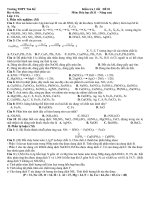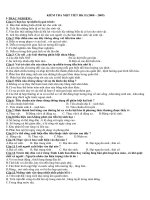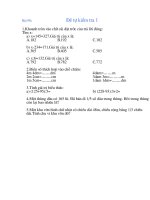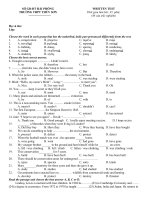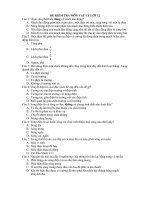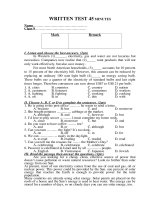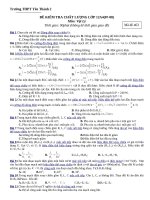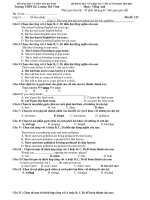de kiem tra 1 tiet No 1 lop 12
Bạn đang xem bản rút gọn của tài liệu. Xem và tải ngay bản đầy đủ của tài liệu tại đây (97.64 KB, 3 trang )
<span class='text_page_counter'>(1)</span>Name: Class:. 45’ test 01 Điểm. Nhận xét của giáo viên. A. Phần trắc nghiệm. Choose the word whose stress is different from the others. Question 1. A. attract B. person C. signal Question 2. A. theory B. chamber C. consist. D. instance D. structure. Choose the word whose underlined part is pronounced differently from the others. Question 3. A. enjoys B.gives C. feels D. takes Question 4. A. decided B. attracted C. expected D. engaged Circle One answer among A, B C and D to complete sentences. Question 5. Peter: How well you are playing! Phil: ________. A. Say it again. I like to hear your words B. I think so. I am proud of myself C. Thank you too much D. Many thanks. That is a nice compliment Question 6. Hoa: “ I think women should not go to work” - Hai: “ I ………..” A. quite agree B. a little agreed C. so agree D. rather agreed Question 7 .Hung : It’s good for the aged to live with their children. Nam: _________________________________ A. You are very nice B. You are well C. Right, I don’t think so D. That’s a good idea Question 8.Both parents ….. hands to give us a nice house and a happy home A. shake B. join C. give D. hang Question 9. Close family should be based ….. understanding each other and faithfulness A. out B. at C. on D. over Question 10. Pay more attention _______ the picture and you can find out who is the robber. A. to B. for C. at D. on Question 11. They haven’t been here since their mother ….. seriously ill A. was B. were C. is D. has been Question 12. The teacher ……. all the windows before he went out A. closed B. has closed C. had closed D. was closing Question 13. John asked me _______ interested in any kind of sports. A if I were B. if were I C. if was I D. if I was Question 14. He advised _______ too far. A. her did not go B her do not go C her not to go D. she did not go Question 15.Poiting at someone is usually considered rude. A. polite B. impolite C. informal D. B&C Question 16. In Vietnam, asking about age, ………..and salary is acceptable. A. marry B. married C. marrying D. marriage Question 17. Body language is a potent form of _______ communication. A. verbal B. non-verbal C. tongue D. oral Question 18. John asked me _______ in English. A. what does this word mean B. what that word means C. what did this word mean D. what that word meant Question 19. The boy waved his hands to his mother, who was standing at the school gate, to _______ her attention. A. attract B. pull C. follow D. tempt.
<span class='text_page_counter'>(2)</span> Question 20. Billy, come and give me a hand with cooking. A. help B. prepared C. be busy. D. attempt. Find one mistake in each sentence below . Question 21. In the last hundred years, traveling becomes much easier and more comfortable. A B C D Question 22. He asked she to lend him some money. A B C D Question 23. Doctor Pike left the hospital after he had an uneventful evening on duty A B C D Read the passage and choose the best answer For more than six million American children, coming home after school means coming back to an empty house. Some deal with the situation by watching TV. Some may hide. But all of them have something in common. They spend part of each day alone. They are called “latchkey children”. They are children who look after themselves while their parents work. And their bad condition has become a subject of concern. Lynette Long was once the principal of an elementary school. She said, “We had a school rule against wearing jewelry. A lot of kids had chains around their necks with keys attached. I was constantly telling them to put the keys inside shirts. There were so many keys; it never came to my mind what they meant.” Slowly, she learned that they were house keys. She and her husband began talking to the children who had keys. They learned of the effect working couples and single parents were having on their children. Fear was the biggest problem faced by children at home alone. One in three latchkey children the Longs talked to reported being frightened. Many had nightmares and were worried about their own safety. The most common way latchkey children deal with their fears is by hiding. They may hide in a shower stall, under a bed or in a closet. The second is TV. They often turn the volume up. It’s hard to get statistics on latchkey children, the Longs have learned. Most parents are slow to admit that they leave their children alone. 24: The phrase “an empty house” in the passage mostly means ______. A. a house with no people inside B. a house with no furniture C. a house with nothing inside D. a house with too much space 25: One thing that the children in the passage share is that ______. A. they all watch TV B. they spend part of each day alone C. they are from single-parent families D. they all wear jewelry 26: The phrase “latchkey children” in the passage means children who ______. A. close doors with keys and watch TV by themselves B. like to carry latches and keys with them everywhere C. are locked inside houses with latches and keys D. look after themselves while their parents are not at home 27: The main problem of latchkey children is that they ______. A. are also found in middle-class families B. watch too much television during the day C. suffer a lot from being left alone D. are growing in numbers 28: What is the main idea of the first paragraph? A. How kids spend free time. B. Why kids hate going home. C. Bad condition of latchkey children. D. Children’s activities at home. 29: Why did a lot of kids have chains around their necks with keys attached? A. They had to use the keys to open school doors. B. Schools didn’t allow them to wear jewelry, so they wore keys instead. C. They were fully grown and had become independent. D. They would use the keys to enter their houses when they came home. 30: What do latchkey children suffer most from when they are at home alone? A. Fear. B. Tiredness. C. Boredom. D. Loneliness. 31: What is the most common way for latchkey children to deal with fears? A. Hiding somewhere. B. Talking to the Longs. C. Having a shower. D. Lying under a TV..
<span class='text_page_counter'>(3)</span> Fill in each numbered blank with one suitable word or phrase When I was a student at Bristol University. It was during the holidays, the Easter holidays, and I needed some money. I had just (24) _________ my driving test, and I felt very pleased with myself so I went to the Job Agency. They phoned me up the next day and asked me if I had a driving (25) ________ so I said, "Yes. ", and they said, "Right. We have got a job (26) _________ you. Go down to Bristol Fruit Market tomorrow morning. " I thought, "I'll be driving a car or a small van. I'll really enjoy it. " They had me drive a huge three-ton lorry. It was (27) _________. I had never driven such a lorry before. One of my workmates said, "Don't be so nervous. You'll surely be (28) _________. " 32. A. passed 33 A. fines 34 A. over 35 A. terrific 36 A. all right. B. jumped B. lice B. for B. terrible B. worse. C. crossed C. client C. through C. wonderful C. bad. D. took off D. license D. out D. nice D. left-over. IV. Choose the sentence which has the closest meaning to the original one. 37. The last time I went to the museum was a year ago. A. I have not been to the museum for a year. B. A year ago, I often went to the museum. C. My going to the museum lasted a year. D At last I went to the museum after a year. 38. The teacher said to us: “ Don’t be late for class” A. The teacher told us not to be late for class B. The teacher told not to be late for class C. The teacher told us to not be late for class D. The teacher told us be not late for class 39. My mother allowed me to go out with my friends A. I was not allowed to go out with my friends B. My mother let me go out with my friends C. My mother lets me go out with my friends D. My mother let me to go out with my friends 40. "How beautiful is the dress you have just bought!"Peter said to Mary. A. Peter promised to buy Mary a beautiful dress. B. Peter said thanks to Mary for her beautiful dress. C. Peter complimented Mary on her beautiful dress. D. Peter asked Mary how she had just bought her beautiful dress.
<span class='text_page_counter'>(4)</span>

